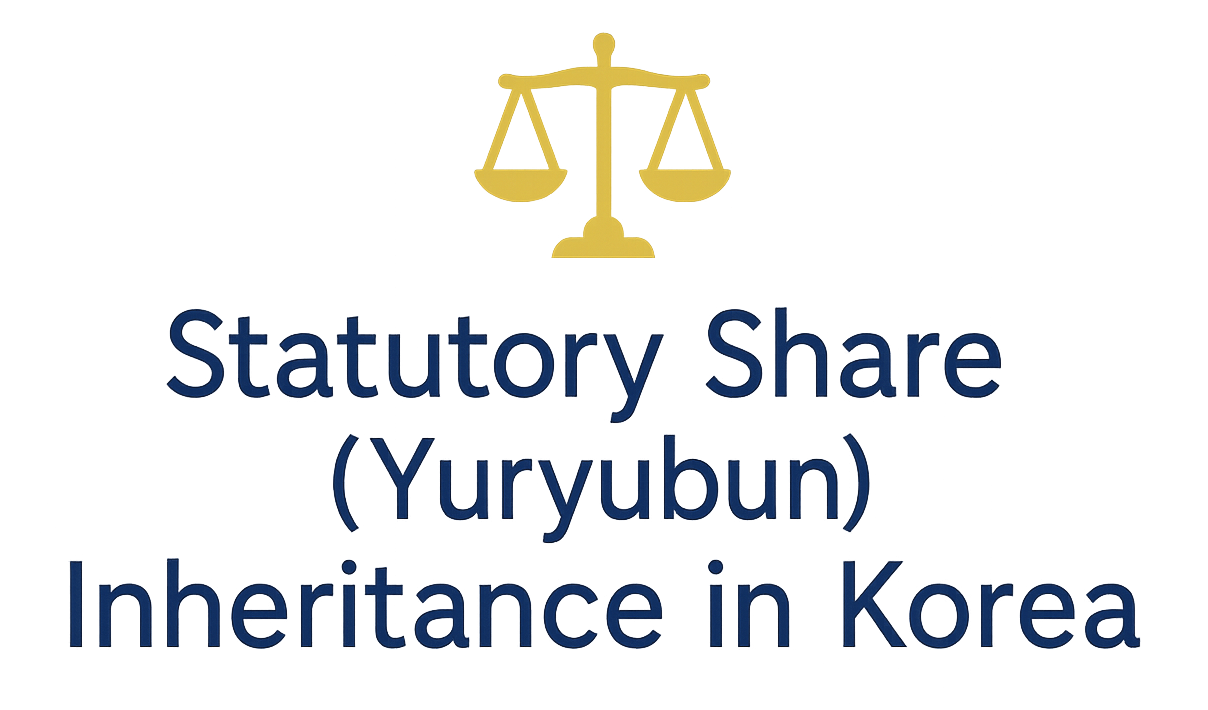If you have issues relating to inheritance in Korea, especially as a foreigner or a Korean living abroad, an English-speaking lawyer in Korea can help you protect your rights under the statutory share (유류분, Yuryubun; also called the legal reserve of inheritance). This guide explains what the statutory share is, who can claim, how much is protected, how lifetime gifts are added back, the deadlines, and what to do next.
What Is the Statutory Share (유류분, Yuryubun)?
Korean law prevents certain heirs from being effectively disinherited by a will or by large lifetime gifts made before death. Protected heirs can demand the return of the portion by which their minimum statutory share was infringed. The statutory share acts as a mandatory minimum against disproportionate wills or donations to favored heirs or third parties.
Who Can Claim the Statutory Share?
Protected heirs are:
- Spouse
- Descendants (children; grandchildren by representation)
- Ascendants (parents, grandparents) only if there are no descendants
Note: Collateral relatives (e.g., siblings) are not statutory-share heirs under the Korean Civil Act; in 2024 the Constitutional Court has held that including siblings in statutory-share (유류분) protection is unconstitutional.
- Spouse & descendants: ½ of their legal inheritance share
- Ascendants: ⅓ of their legal inheritance share
Example: If the decedent is survived by two children, each child’s legal share is ½. Their statutory minimums are ¼ each (½ × ½).
Do Lifetime Gifts Count Toward the Calculation?
Yes, this is where most disputes arise. When legal conditions are met, lifetime gifts are brought back into the estate for the statutory share calculation:
- Gifts made within 1 year before death are normally included.
- Older gifts can also be included if both donor and donee knew the gift would prejudice a protected heir’s statutory share.
- Gifts to spouses or children are frequently scrutinized; transfers to foundations or third parties may also be added back if conditions are satisfied.
Practical tip: Early legal intervention is critical. Tracing, documentation, and review of accounts (including nominee or joint accounts) often determine outcomes.
Deadlines (Statutes of Limitation) You Cannot Miss
Statutory share claims have strict time limits:
- 1-year subjective period: Runs from when the heir knew (i) the inheritance commenced and (ii) the gift/testamentary gift that infringes the statutory share.
- 10-year absolute period: Runs from the date of death, regardless of knowledge.
Practical tip: If you’re approaching either date, act immediately. Missing a deadline can bar your claim entirely.
Common Scenarios (and How Courts Approach Them)
- “Everything to a foundation.” Charitable transfers can be added back if statutory criteria are met. Expect document-heavy tracing of funds and gift deeds.
- “Gifts long ago.” Older lifetime gifts may still count if you prove both parties knew the transfer would prejudice a protected heir’s statutory share. Evidence of intent/knowledge is key.
- “Business or investment accounts.” Inter-spousal/parent-child accounts, nominee arrangements, and joint accounts often require tracing to determine true ownership and gift characterization.
Why Legal Support in Korea Matters for Expats
For foreign clients and overseas Koreans, statutory share cases combine language, procedure, and cross-border hurdles:
- Language & procedure: Filings, evidence, and hearings are in Korean.
- Complex rules: Korean inheritance law differs from common-law systems and demands specialized strategy.
- Cross-border logistics: Apostille/consular legalization, foreign bank records, and service abroad must be coordinated.
- Urgent timelines: Strict 1-year and 10-year limits require prompt action.
Bilingual Legal Support in Korea from a U.S.-Licensed Attorney., will bridge the language gap, quantify your statutory share, add back lifetime gifts where appropriate, preserve evidence, and litigate or negotiate effectively.
How Kang & Shin Can Help
- Eligibility assessment for a statutory share (유류분 / Yuryubun) claim
- Calculation & modeling of your share, including lifetime gifts/donations
- Demand letters & court filings to recover the infringed portion
- Cross-border support: document authentication (apostille/consular), overseas evidence
- Deadline protection so your claim isn’t time-barred
Next step: Contact Kang & Shin to consult with an experienced attorney in Korea — who is licensed in the U.S., fluent in English, and trusted by foreign clients — specializing in complex inheritance litigation.


